高二英语(人教版)选择性必修二Unit2 Bridging Cultures Reading
- 格式:pptx
- 大小:5.42 MB
- 文档页数:51
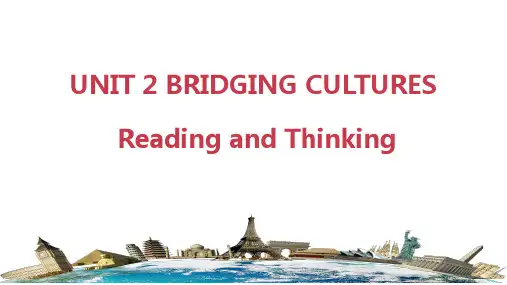
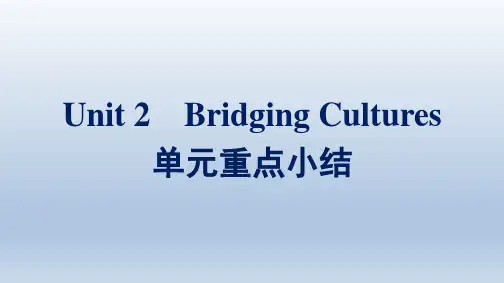
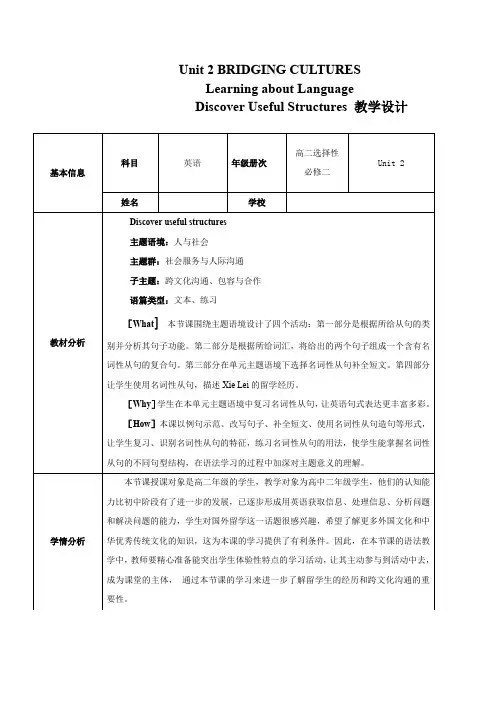
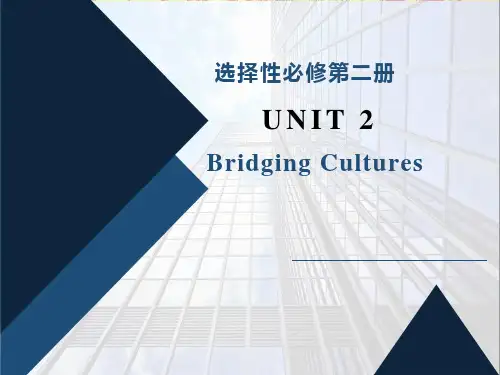


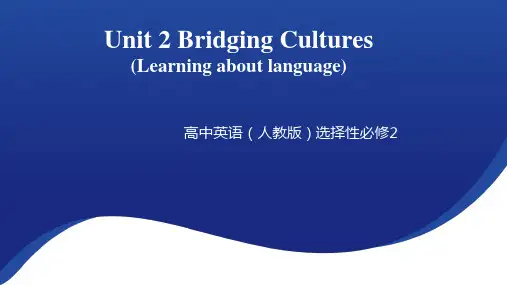

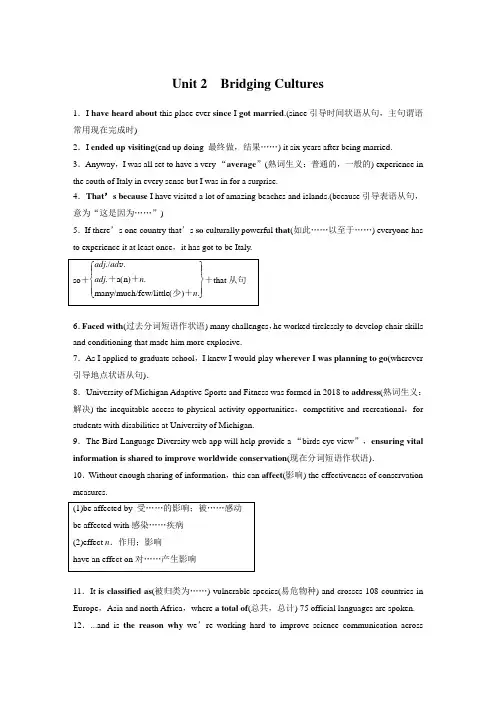
Unit 2Bridging Cultures1.I have heard about this place ever since I got married.(since引导时间状语从句,主句谓语常用现在完成时)2.I ended up visiting(end up doing 最终做,结果……) it six years after being married. 3.Anyway,I was all set to have a very “average”(熟词生义:普通的,一般的) experience in the south of Italy in every sense but I was in for a surprise.4.That’s because I have visited a lot of amazing beaches and islands.(because引导表语从句,意为“这是因为……”)5.If there’s one country that’s so culturally powerful that(如此……以至于……) everyone has to experience it at least once,it has got to be Italy.6.Faced with(过去分词短语作状语) many challenges,he worked tirelessly to develop chair skills and conditioning that made him more explosive.7.As I applied to graduate school,I knew I would play wherever I was planning to go(wherever 引导地点状语从句).8.University of Michigan Adaptive Sports and Fitness was formed in 2018 to address(熟词生义:解决) the inequitable access to physical activity opportunities,competitive and recreational,for students with disabilities at University of Michigan.9.The Bird Language Diversity web app will help provide a “birds eye view”,ensuring vital information is shared to improve worldwide conservation(现在分词短语作状语).10.Without enough sharing of information,this can affect(影响) the effectiveness of conservation measures.11.It is classified as(被归类为……) vulnerable species(易危物种) and crosses 108 countries in Europe,Asia and north Africa,where a total of(总共,总计) 75 official languages are spoken. 12....and is the reason why we’re working hard to improve science communication acrosslanguages.(why引导定语从句,修饰the reason)13.My university is located in(位于,坐落于) Moscow,the capital of Russia,which is a city with a long history.14.The second(the+瞬间名词moment,minute,instant,second等,意为“一……就……”,相当于as soon as) I stepped out of(走出) the airport,I immediately felt how cold it was outside. 15.I gradually overcame the difficulties of studying abroad and came to adjust to(适应)my new environment.16.The first challenge was the language barrier(语言障碍).17.After learning Russian in China,I realized that my skills were nowhere near enough(远远不够).18.Tickets for concerts and cultural events here are relatively cheap,making it easy to enrich my life on weekends.(现在分词短语作结果状语;make it+adj.+to do)。
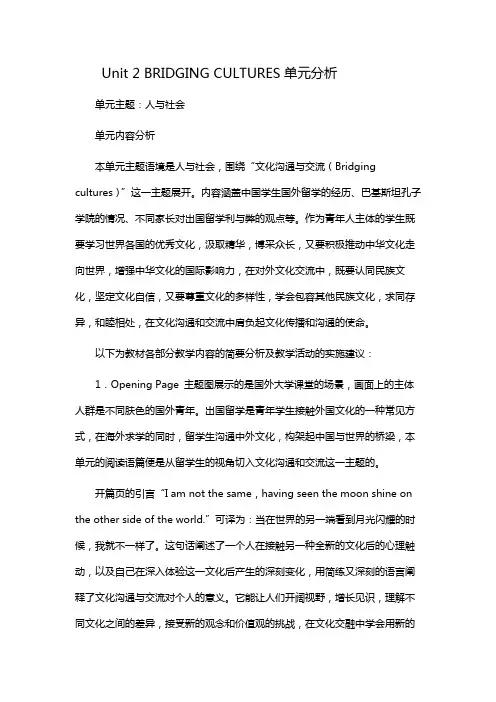
Unit 2 BRIDGING CULTURES单元分析单元主题:人与社会单元内容分析本单元主题语境是人与社会,围绕“文化沟通与交流(Bridging cultures)”这一主题展开。
内容涵盖中国学生国外留学的经历、巴基斯坦孔子学院的情况、不同家长对出国留学利与弊的观点等。
作为青年人主体的学生既要学习世界各国的优秀文化,汲取精华,博采众长,又要积极推动中华文化走向世界,增强中华文化的国际影响力,在对外文化交流中,既要认同民族文化,坚定文化自信,又要尊重文化的多样性,学会包容其他民族文化,求同存异,和睦相处,在文化沟通和交流中肩负起文化传播和沟通的使命。
以下为教材各部分教学内容的简要分析及教学活动的实施建议:1.Opening Page 主题图展示的是国外大学课堂的场景,画面上的主体人群是不同肤色的国外青年。
出国留学是青年学生接触外国文化的一种常见方式,在海外求学的同时,留学生沟通中外文化,构架起中国与世界的桥梁,本单元的阅读语篇便是从留学生的视角切入文化沟通和交流这一主题的。
开篇页的引言“I am not the same,having seen the moon shine on the ot her side of the world.”可译为:当在世界的另一端看到月光闪耀的时候,我就不一样了。
这句话阐述了一个人在接触另一种全新的文化后的心理触动,以及自己在深入体验这一文化后产生的深刻变化,用简练又深刻的语言阐释了文化沟通与交流对个人的意义。
它能让人们开阔视野,增长见识,理解不同文化之间的差异,接受新的观念和价值观的挑战,在文化交融中学会用新的眼光看待自己的文化,更全面地理解人性和世界,从而形成更为完整的人生观和世界观。
2.Reading and Thinking 阅读语篇是一篇刊登在伦敦一所大学校报上的文章,讲述了中国商科留学生谢蕾国外的留学生活。
文章有两条线索,一条线索介绍了谢蕾初到国外时在生活和学业上遇到的种种困难和挑战,并逐渐适应新环境的经历,以及伴随这些经历所产生的一系列情感体验的变化,具体表现为:离开祖国和家人朋友飞往陌生国度时的兴奋、紧张与迷茫,与寄宿家庭相处过程中获得的安慰,听到导师提出学术要求时的困惑,在学业上取得进步后的惊喜,作报告成功后重获的信心,以及逐渐适应新生活后内心的轻松自在。
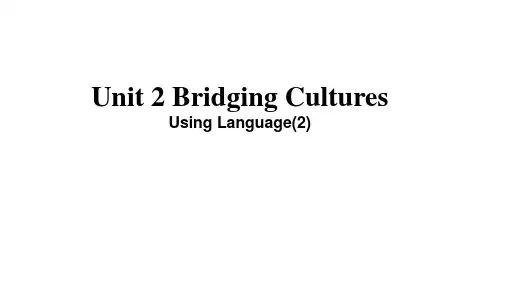
Section ⅡLearning About Language每/日/金/句:Studying abroad can broaden our horizons and at the same time build a bridge for cross-cultural exchanges.出国留学可以开阔我们的视野,同时也架起了跨文化交流的桥梁。
课堂提升素养探究新知发展语言知识1(教材P16)I became more motivated, and I'm also a lot more ambitious now!我变得更加积极了,现在也更加雄心勃勃了!◎motivate v t.成为……的动机;激发;激励(1)motivate sb. to do sth. 激励某人做某事(2)motivation n. 动力;积极性;动机(3)motivated adj. 积极的;主动的[佳句]Staying motivated can help you focus on the work in hand and achieve your goal.保持积极性可以帮助你专注于手头的工作,实现你的目标。
[练通]——单句语法填空①Students should be ________ (motivate) to develop good habits and behave themselves.②With high ________ (motivate) and enthusiasm, we can keep on learning.[写美]——应用文佳句③只有这样,我才能更容易地适应社会,并保持动力,追求更好的生活。
Only by doing so can I adjust myself to society more easily and ________________________________________________________________________.2(教材P17)The advisor talked about maintaining reasonable expectations when studying abroad.这位顾问谈到在国外学习时要保持合理的期望。
选择性必修其次册UNIT 2 BRIDGING CUL TURESⅠ.阅读理解Technology use in classYou will be allowed to use your favorite type of technology (e.g.,laptop,iPad) in class if you choose to do so,since some people prefer taking notes that way.If you decide to use it,please avoid distractions,like e-mail checking or accessing social media during class.Academic integrityYou will be expected to be the author of the assignments you turn in for this course.Your papers will require you to draw upon existing research to inform and lend credibility (可信度) to your arguments.To credit the ideas of others properly,you must follow two main rules:·Always cite the source of a finding,idea,or argument that is not your own,no matter how much rewording you have done.·Always put the findings,ideas,and arguments you cite into your own words.If a direct quote is absolutely necessary,put the text in quotation marks (引号) and include a page number in your citation.Absences and late assignmentsYou are expected to attend every class,since your participation in class will count towards your final grade.Students with excused absences will have a chance to complete missed class assignments (and participation) without punishment.Otherwise,class participation can only be completed during class.Assignments submitted after the deadline will be considered late te assignments will be graded with 1/2 of the grade if submitted by no more than one week following the original deadline.If not submitted within one week following the original deadline,late assignments will not be graded.1.Where is this text probably taken from?A.A school regulation.B.A college textbook.C.An exam paper.D.An academic article.2.To achieve academic integrity,what are you expected to do?A.Avoid assessing media during class.B.Submit your totally original work.C.Present others’ ideas as your own.D.Cite others’ ideas in a proper way.3.What will happen if you submit an assignment within one week after the due date?A.You will be punished.B.You will get a half grade.C.You will receive a zero.D.You will have to rewrite it.If the West has the apple,the East has the king of fruits:the mighty mango.Called “aam” in Hindi,Urdu and Punjabi,this tropical fruit traces its origins to South Asia.Urdu and Hindi literature are filled with references to this fruit that once filled the kitchens and gardens of emperors.Everyone is crazy about mangoes during the summer months in South Asia.City streets in India are lined with vendors(小贩) selling all varieties of mangoes.Young and old bargain for better prices,mangoes are sent as gifts,restaurants have special mango menu items and the fruit becomes a gesture of goodwill between India and Pakistan,with the choicest varieties sent across the border to celebrate each country’s independence days.South Asians all over the world await mango season.South Asian stores receive shipments of the fruit,though they are limited in quality and quantity.Each year,I savor(品尝) my mangoes,though I’m saddened that popular varieties aren’t easily available in Vancouver.Mango memories take me back to the city I was born in:Rourkela in the eastern part of India.In late March,just as the days would start to become hot,I remember mango trees blooming with their fresh fragrance in the breeze as we biked to e April,the trees would start bearing fruit.I remember the thrill of sneaking out to collect raw mangoes,climbing onto the roof of our quarters and eating them with pink salt and powdered red chilies (红辣椒粉) alongside my best friend.Mango stories from my childhood are endless.But this summer in Vancouver,I can’t help but remember my sweet mango memories.I realize that I need to wander the streets of my home country,to feel the intense heat of the summer months and soak in the country of my birth.Instead,I am in this state savoring mangoes,enjoying those I can find in Canada but missing the Indian varieties.This year,the mighty mango has become a symbol of the sense of loss that each one of us is feeling.4.What do we know about the mangoes in South Asia?A.They are very cheap in summer in India.B.They are a symbol of independence in India.C.In Pakistan,they are mainly grown on the borders.D.The fruit is regarded as a kind gesture between India and Pakistan.5.What does Paragraph 4 mainly talk about?A.The growth stages of mangoes.B.The reasons for the author’s preference for mangoes.C.The author’s mango memories back in his home country.D.The favorable seasons to grow mangoes.6.What’s the author’s purpose in writing this article?A.To explain why mangoes are the king of fruits in the East.B.To recall his mango memories and express his homesickness.C.To analyze the negative impact of being abroad.D.To share his experience in Canada.7.Which of the following is a suitable title for the text?A.Mango MemoriesB.The King of Fruits in the EastC.My Affection for My MotherlandD.The Different Tastes of MangoesTeens who have good,supportive relationships with their teachers enjoy better health as adults,according to research published by an American research centre.“This research suggests that improving students’ relationships with teachers could have positive and long-lasting effects beyond just academic success,” said Jinho Kim,a professor at Korea University and author of the study.“It could also bring about health implications in the long run.”Previous research has suggested that teens’ social relationships might be linked to health outcomes in adulthood.However,it is not clear whether the link between teen relationships and lifetime health is causal(因果关系的)—it could be that other factors,such as different family backgrounds,might contribute to both relationship problems in adolescence and poor health in adulthood.Also,most research has focused on teens’ relationships with their peers(同龄人),rather than on their relationships with teachers. To explore those questions further,Kim analyzed data on nearly 20,000 participants from the Add Health study,a national study in the US that followed participants from seventh grade into early adulthood.The participant pool included more than 3,400 pairs of siblings(兄弟姐妹).As teens,participants answered questions,like“How often have you had trouble getting along with other students and your teachers?”As adults,participants were asked about their physical and mental health.Kim found that participants who had reported better relationships with both their peers and teachers in middle and high school also reported better physical and mental health in their mid-20s.However,when he controlled for family background by looking at pairs of siblings together,only the link between good teacher relationships and adult health remained significant.The results suggest teacher relationships are more important than previously realized and that schools should invest in training teachers on how to build warm andsupportive relationships with their students.“This is not something that most teachers receive much training in,”Kim said.“But it should be.”8.What does the underlined word “implications” in Paragraph 2 refer to?A.Recipes.B.Habits.C.Benefits.D.Risks.9.What is Paragraph 3 mainly about?A.Poor health in adolescence.B.Limitations of the previous research.C.Teens’ relationships with their peers.D.Factors affecting health in adulthood.10.What does Kim’s research show?A.Good adult health depends on teens’ good teachers.B.Good family background promises long-term adult health.C.Healthy peer relationship leads to students’ academic success.D.Positive student-teacher relationship helps students’ adult health.11.Where does this text probably come from?A.A health magazine.B.A medical report.C.A term paper.D.A family survey.Ⅱ.七选五(2024·临沂二模)Being late is a tendency that some people cannot seem to shake.Many factors contribute to continual lateness, including time perception, time management and personality.We all know someone who never seems to be on time, whether it’s to a lunch date or a work meeting.__1__“It is likely that there’s a mechanism in the brain that causes some people to be late for meetings because they underestimate the time it will take them to get there,”Hugo Spiers, a professor at University College London told Li v e Science.__2__ Research suggests that neurons in the hippocampus(海马体)acting as “time cells” contribute to our perception and memory of events, but why exactly some peoplecontinually underestimate time is unclear.One factor may be how familiar we are with a space.For the 2017 study, Spiers asked 20 students who had newly moved to London to sketch a map of their college district and estimate travel times to different destinations.The students’ space estimates expanded if they knew an area well.__3__“If you’re very familiar with a space, you start to discount the trouble it will take,” Spiers said.Another environmental factor may be crowdedness.In a 2022 study in the journal Virtual Reality, researchers asked participants to estimate the length of more or less crowded simulated (模拟的)subway trips.They found that crowded commutes felt like they took 10% longer than less busy rides.__4____5__ Certain character features, such as reduced conscientiousness(责任心), can cause some people to forget tasks that they had planned ahead of time.A.Personality also plays a role in running late.B.That was linked to it being an unpleasant experience.C.We make time estimates based on how urgent the tasks are.D.However, their estimates of travel time contracted with familiarity.E.But is there a good explanation for why some people are always late?F.A region of the brain, called hippocampus,processes some aspects of time.G.That’s because people who run late tell themselves and others they can be punctual.选择性必修其次册UNIT 2Ⅰ.【语篇解读】本文是应用文。
UNIT2BRIDGING CULTURES主题语境人与社会——跨文化沟通、包容与合作【背景文化】Misadventures in EnglishLast week,our forum①asked if you had any funny or strange stories about using English.We didn't expect to get so many posts②!Here are some of our favourites,to remind us that some of the English we learn in the classroom is rather different from the English in the outside world!Yancy:People say that the British always play safe③with what they eat.Not true!I went to a summer school in Manchester and my English teacher was called Maggie.One day,a different teacher took our class.He told us that Maggie couldn't teach that day COZ she had a frog in her throat.Poor Maggie—but why did she try to eat such a big frog?Sophie:When I first visited New York,I went to a downtown shopping centre to buy some winter boots.At the information desk at the entrance,I asked a lady where the shoe section was. She said that it was on the first floor.So I went up to the first floor,but couldn't find any shoes.I decided to leave.When I was looking for the exit,I saw that shoes were actually sold downstairs on the ground floor,not the first floor.Why did she give me the wrong information?Julien:I've got an English penfriend,who I finally got to meet in London this summer.He had told me that his grandfather was“really wicked④”.But when I met his grandfather,I liked him a lot.I found it very odd⑤.Why did my friend use a negative word about such a nice man?Zheng Xu:The British must have really high standards.I was part of a student exchange programme between a university in England and my university in China.I spent days preparing and writing my first English paper.I knew I had done a good job and was looking forward to getting a positive comment.When I got the paper back,I found my teacher had written the comment“Not bad!”Not bad?But there weren't any errors⑥in my paper.(选自外研版新教材必修第一册Unit2)词汇积累①forum/'fɔːrəm/n.(因特网上的)论坛②post/pəʊst/n.帖子③play safe谨慎行事;避免风险④wicked/'wɪkɪd/adj.邪恶的;极好的⑤odd/ɒd/adj.奇特的,古怪的⑥error/'erə/n.错误,谬误SectionⅠReading and Thinking每/日/金/句:Not only can studying abroad help us learn different cultures and knowledge from foreign countries,it can also enrich our lives culturally and economically.海外留学不仅可以帮助我们从国外学习不同的文化和知识,还可以从文化和经济的角度充实我们的生活。
人教版(2023)选择性必修第二册Unit 2 Bridging Cultures 学案(含答案)Unit 2 Bridging CulturesUnit2 话题文化碰撞词汇complex ,insight ,grasp,expense,deny,optimistic ,gain,budget ,logical,outcome短语participate in,speak up,feel at home,engage in ,get involved in,comfort zone ,cost an arm and a leg ,side with,as far as I know,as far as I am concerned ,in summary,generally speaking句型1.the first time引导时间状语从句,意为“第一次……” 2.“find+宾语+宾语补足语” 3.while引导让步状语从句,意为“尽管,虽然”。
4.that引导同位语从句语法复习名词性从句写作如何写观点类作文考点1.qualification n.(通过考试或学习课程取得的)资格;学历Xie Lei is studying for a business qualification at a university in China and has come to our university on a year-long exchange programme.(教材P14)谢蕾在中国的一所大学攻读工商管理资格,来我校进行为期一年的交流项目。
【拓展】(1)a qualification/qualifications for...have/has qualifications to do sth(2)qualify vi. the last time上一次...时; each/every time每次...时; next time下次...时; the moment/ the minute/ the instant... 一...就... 3.状语从句的省略(1)当when、while、before、after、unless、as if、if 等引导的状语从句中的主语和主句的主语一致,或状语从句的主语为it,且谓语中含有be动词的某种形式时,则可省略从句中的主语和be动词或it和be动词。
选必二Unit2单元重点归纳一、重点词汇1.qualification n.(通过考试或学习课程取得的)资格;学历have qualifications for... 有……的资格qualify v t.&v i.(使)具备资格;(使)合格qualify sb. for... 使某人具备……(资格)qualified adj.有资格的;合格的be qualified for... 能胜任……2.ambition n.追求的目标;夙愿;野心;抱负the ambition to do/of doing sth. 做某事的抱负One's ambition is to do sth. 某人的抱负是做某事ambitious adj.有野心的;有雄心的be ambitious to do sth. 对做某事怀有热切的希望3.get/be used to 习惯于做某事used to do sth. 过去常常做某事;过去曾经做某事(而现在不再)be used to doing sth.习惯于做某事(to是介词)be used to do sth. 被用来做某事(被动语态)4.adaptation n.适应;改编本make an adaptation to... 适应……adapt v.(使)适应;(使)适合;改编;改写adapt to... 适应……;适合……adapt oneself to... 使自己适应……adapt sth. for... 把某物改编成……adapt sth. from... 由……改编成某物5.fort n.安慰;令人感到安慰的人或事物;舒服;安逸v t.安慰;抚慰in fort 舒适地be a fort to sb. 对某人来说是一个安慰fort sb. with sth. 用某物安慰某人fortable adj.舒适的;舒服的6.participation n.参加;参与participate v i.参加;参与participate with sb. in sth. 同某人参与某事participate in (doing) sth. 参与(做)某事participant n.参加者;参与者7.presentation n.报告;陈述;出示;拿出present n.现在,目前;礼物,赠品v t.赠送;呈现;提交;出示adj.现在的;目前的;出席的;在场的at present=at the present time 目前;现在for the present 目前;暂时present sth. to sb.=present sb. with sth.授予/赠送某人某物;把某物交给某人be present at... 出席……8.speak up大声点说;明确表态speak of... 谈及……speak for... 代表……说话;充当……的代言speak to/with sb. about sth. 和某人交谈某事speak well/highly/ill/badly of... 说……的好/坏话;对……高度赞扬/评价不高9.engage v i.参加;参与(活动)v t.吸引(注意力、兴趣);聘用engage in (使)从事;参与engage sb. to do sth. 雇用某人做某事engaged adj.已订婚;被占用的;使用中的be engaged to sb. 与某人订婚be engaged in sth. 忙于某事engagement n.订婚;约会;交战10.involve v t.包含;需要;涉及;影响;(使)参加involve (doing) sth. 包含/需要(做)某事involve oneself in sth. 使某人参与某事be/get involved in... 参与……;卷入……;与……有关联involvement n.参与;卷入;牵连11.dramatic adj.巨大的;突然的;急剧的;喜剧(般)的;戏剧性的;戏剧般的;夸张做作的;激动人心的;引人注目的;给人印象深刻的dramatic arts 戏剧艺术dramatic performances 戏剧表演a dramatic victory 激动人心的胜利dramatically ad v.戏剧地;显著地drama n.戏;剧;戏剧文学;戏剧艺术12. expense n.费用;花费;开销;开支afford the expense 承担费用spare no expense 不惜费用at one's expense 由某人付钱at the expense of... 以牺牲/损坏……为代价13.end up 以做某事而告终;结束;最终成为end up doing sth. 最终做某事end up+adj./with/in/as... 以……而告终;在……中结束;最后处于……;最终成为……end with... 以……结束14.behave v t.表现v i.&v t.表现得体;有礼貌behave oneself/well 守规矩;举止得体wellbehaved adj.表现好的badlybehaved adj.表现差的behaviour n.行为;举止;习性15. contribute to捐献,捐赠(尤指款或物);捐助;是……的原因;导致;增进;有助于;为……作贡献;为……撰稿contribute to=donate to捐献;捐赠;contribute to=lead to是……的原因;导致contributor n.捐款人;撰稿人;起作用的因素contribution n.贡献;捐款;捐献物;稿件16. strengthen v i.&v t.加强;增强;巩固strengthen cooperation 加强合作strengthen the city wall 加固城墙strength n.体力;力气;优点strong adj.强壮的;强健的strongly ad v.坚定地;强有力地;强烈地(说服);(气味)浓重地17.deny v t.否认;否定;拒绝deny (doing) sth./that... 否定/否认(做过)某事/……deny sb. sth.=deny sth. to sb. 拒绝给某人某物There is no denying that... 不可否认……It can't be denied that... 不容否认的是……二、重点句型1.It was the first time that she had left China.这是她第一次离开中国。